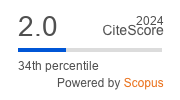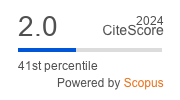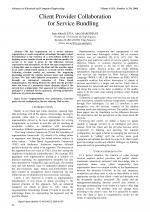| 1/2008 - 7 |
Client Provider Collaboration for Service BundlingLETIA, I. A. |
| Extra paper information in |
| Click to see author's profile in |
| Download PDF |
Author keywords
argumentation over preferences, customer needs, service configuration, service offering, web services
References keywords
services(7), agents(7), systems(6), reasoning(6), logic(5), argumentation(5), service(4), multiagent(4), autonomous(4)
Blue keywords are present in both the references section and the paper title.
About this article
Date of Publication: 2008-04-02
Volume 8, Issue 1, Year 2008, On page(s): 36 - 43
ISSN: 1582-7445, e-ISSN: 1844-7600
Digital Object Identifier: 10.4316/AECE.2008.01007
Web of Science Accession Number: 000259903500007
SCOPUS ID: 77955601654
Abstract
The key requirement for a service industry organization to reach competitive advantages through product diversification is the existence of a well defined method for building service bundles. Based on the idea that the quality of a service or its value is given by the difference between expectations and perceptions, we draw the main components of a frame that aims to support the client and the provider agent in an active collaboration meant to co-create service bundles. Following e3-value model, we structure the supporting knowledge around the relation between needs and satisfying services. We deal with different perspectives about quality through an ontological extension of Value Based Argumentation. The dialog between the client and the provider takes the form of a persuasion whose dynamic object is the current best configuration. Our approach for building service packages is a demand driven approach, allowing progressive disclosure of private knowledge. |
| References | | | Cited By «-- Click to see who has cited this paper |
| [1] H. Akkermans, Z. Baida, J. Gordijn, N. Pena, I. Laresgoiti, A. Altuna: "Value webs: Ontology-based bundling of real-world services". IEEE Intelligent Systems 19, 2004. [CrossRef] [Web of Science Times Cited 63] [SCOPUS Times Cited 109] [2] Z. Baida, J. Gordijn, H. Akkermans, H. Saele, A. Morch: "Finding eservice offerings by computer-supported customer needs reasoning". International Journal of E-Business Research 1, 2005. [CrossRef] [Web of Science Times Cited 7] [SCOPUS Times Cited 14] [3] T. Bench-Capon, S. Doutre, P. Dunne: "Audiences in argumentation frameworks". Artificial Intelligence 171, 2007. [CrossRef] [Web of Science Times Cited 61] [SCOPUS Times Cited 86] [4] A. Bondarenko, F. Toni, R. A. Kowalski: "An Assumption-Based Framework for Non-Monotonic Reasoning". Logic Programming and Non-monotonic Reasoning, Proceedings of the Second International Workshop, Portugal, 1993 [5] C. Chesnevar, J. Mcginnis, S. Modgil, I. Rahwan, C. Reed, G. S. Simari, M. Vreeswijk, G. Willmott: "Towards an argument interchange format". Knowledge engineering review, 21(4), 2006 [CrossRef] [Web of Science Times Cited 186] [SCOPUS Times Cited 264] [6] S. Doutre, P. McBurney, L. Perroussel, J.M. Thevenin: "Arguing for gaining access to information". 6th International Joint Conference on Autonomous Agents and Multiagent Systems, USA, 2007 [CrossRef] [SCOPUS Times Cited 1] [7] P. M. Dung. "On the acceptability of arguments and its fundamental role in nonmonotonic reasoning, logic programming and n-person games". Artificial Intelligence, 77(2), 1995. [CrossRef] [Web of Science Times Cited 2674] [SCOPUS Times Cited 3874] [8] G. Governatori, M. Maher, D. Billington, G. Antoniou: "Argumentation semantics for defeasible logics". Journal of Logic and Computation,, 14(5), 2004 [CrossRef] [Web of Science Times Cited 160] [SCOPUS Times Cited 209] [9] D. Greenwood, M. Lyell, A. Mallya, H. Suguri: "The IEEE FIPA approach to integrating software agents and web services". 6th International Joint Conference on Autonomous Agents and Multiagent Systems, USA, 2007. [CrossRef] [SCOPUS Times Cited 37] [10] R. Lin, S. Kraus, J. Wilkenfeld, J. Barry: "An automated agent for bilateral negotiation with bounded rational agents with incomplete information". 17th European Conference on Artificial Intelligence, Italy, 2006. [11] S. Lamparter, A. Ankolekar, R. Studer, S. Grimm: "Preference-based selection of highly configurable web services". 16th International World Wide Web Conference, Canada, 2007. [CrossRef] [SCOPUS Times Cited 127] [12] A. Malucelli, D. Palzer, E. Oliveira: "Ontology-based services to help solving the heterogeneity problem in e-commerce negotiations". Electronic Commerce Research and Applications, 5, 2006. [CrossRef] [Web of Science Times Cited 34] [SCOPUS Times Cited 53] [13] L. Perrussel, S. Doutre, J. Thevenin, P. McBurney: "A persuasion dialog for gaining access to information", International Workshop on Argumentation in Multi-Agent Systems, USA, 2007. [14] A. Rahwan: "An Argumentation based approach for practical reasoning". 5th International Joint Conference on Autonomous Agents and Multiagent Systems, Japan, 2006. [CrossRef] [SCOPUS Times Cited 78] [15] T. Skylogiannis, G. Antoniou, N. Bassiliades, G. Governatori, A. Bikakis: "DR-NEGOTIATE - A system for automated agent negotiation with defeasible logic-based strategies". Data and Knowledge Engineering, 63(2), 2007. [CrossRef] [Web of Science Times Cited 34] [SCOPUS Times Cited 40] [16] C. Sierra, J. Debenham: "The LOGIC negotiatin model". 6th International Joint Conference on Autonomous Agents and Multiagent Systems, USA, 2007. [CrossRef] [SCOPUS Times Cited 31] [17] S. Stein, T. Payne, N. Jennings: "An effective strategy for the flexible provisioning of service workflows", Huang, J., Kowalczyk, R., Maamar, Z., Martin, D., Mueller, I., Stoutenberg, S., Sycara, K., eds.: Service Oriented Computing: Agents, Semantics and Engineering. LNCS 4504. Springer-Verlag, 2007. [CrossRef] [SCOPUS Times Cited 8] [18] V. Tosic, B. Pagurek, K. Patel: "WSOL - A Language for the Formal Specification of Classes of Service for Web Services", International Conference on Web Services, USA, 2003 [19] A. Z. Wyner, T. J. M. Bench-Capon: "Towards an Extensible Argumentation System". Symbolic and Quantitative Approaches to Reasoning with Uncertainty, 9th European Conference, Tunisia, 2007. [CrossRef] [SCOPUS Times Cited 9] [20] M. Aiello, F. Rosenberg, C. Platzer, A. Ciabattoni, S. Dustdar: "Service QoS composition at the level of part names", Bravetti, M., Nunes, M., Zavattaro, G., eds.: Web Services and Formal Methods. LNCS 4184. Springer-Verlag, 2006 [CrossRef] [SCOPUS Times Cited 5] Web of Science® Citations for all references: 3,219 TCR SCOPUS® Citations for all references: 4,945 TCR Web of Science® Average Citations per reference: 161 ACR SCOPUS® Average Citations per reference: 247 ACR TCR = Total Citations for References / ACR = Average Citations per Reference We introduced in 2010 - for the first time in scientific publishing, the term "References Weight", as a quantitative indication of the quality ... Read more Citations for references updated on 2025-06-04 18:55 in 108 seconds. Note1: Web of Science® is a registered trademark of Clarivate Analytics. Note2: SCOPUS® is a registered trademark of Elsevier B.V. Disclaimer: All queries to the respective databases were made by using the DOI record of every reference (where available). Due to technical problems beyond our control, the information is not always accurate. Please use the CrossRef link to visit the respective publisher site. |
Faculty of Electrical Engineering and Computer Science
Stefan cel Mare University of Suceava, Romania
All rights reserved: Advances in Electrical and Computer Engineering is a registered trademark of the Stefan cel Mare University of Suceava. No part of this publication may be reproduced, stored in a retrieval system, photocopied, recorded or archived, without the written permission from the Editor. When authors submit their papers for publication, they agree that the copyright for their article be transferred to the Faculty of Electrical Engineering and Computer Science, Stefan cel Mare University of Suceava, Romania, if and only if the articles are accepted for publication. The copyright covers the exclusive rights to reproduce and distribute the article, including reprints and translations.
Permission for other use: The copyright owner's consent does not extend to copying for general distribution, for promotion, for creating new works, or for resale. Specific written permission must be obtained from the Editor for such copying. Direct linking to files hosted on this website is strictly prohibited.
Disclaimer: Whilst every effort is made by the publishers and editorial board to see that no inaccurate or misleading data, opinions or statements appear in this journal, they wish to make it clear that all information and opinions formulated in the articles, as well as linguistic accuracy, are the sole responsibility of the author.



